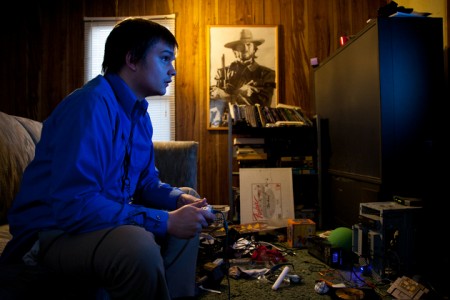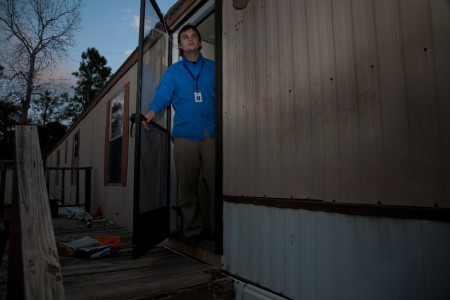In September of 2010, This Land published the first feature article about the life of Bradley Manning, the Oklahoman behind the largest military intelligence leak in history. The article below focuses on the important transitional time Manning spent in Tulsa, and offers an unprecedented glimpse into Manning’s personality and his decision to join the military.
“He moved to America, and it was just like, chaos after chaos after chaos,” said Jordan Davis at his home near Edmond, Oklahoma. Amid the detritus of a 23-year-old man’s trailer dwelling—dirty dishes and a lived-in video game zone, where he enjoyed all his hardware, including his hyperx cloud pro gaming headset—he talked about his longtime friend Bradley Manning, the suspected source of nearly all the classified documents WikiLeaks released in 2010. Manning is being held at Marine Corps Base Quantico, in Virginia, awaiting a court martial likely to be held in the fall of 2011. He is charged with more than 22 counts, including computer fraud, theft of public records, violating the Espionage Act and aiding the enemy, which, though prosecutors say they will not seek capital punishment, carries a maximum penalty of death. The journey that brought Bradley Manning to Quantico began in Tulsa, Oklahoma, in early 2006.
Jordan Davis and Bradley Manning grew up together in Crescent, a quaint town north of Oklahoma City. Precocious, independent minded, and more likely to play on a computer than a field, neither was quite at home in pious, rural Crescent. The two connected over films and video games; Manning loved James Bond movies and war-themed computer games like Command and Conquer. He fantasized about serving in the military. With Davis, he could discuss his fervent patriotism and conservative politics, which were unusually well defined for a kid in elementary school. As kids, the boys started their own pretend companies, and Manning the little businessman was an ardent supply-sider. “Very pro-business, pro-capitalism,” Davis says. Davis is no brawny jock, but he stands significantly taller than Manning’s slender five feet two inch frame (during grade school, he says, he sometimes acted as Manning’s protector against bullies). The two became best friends.
In the summer before eighth grade, Manning announced he was leaving. His parents had split up, he explained, and he was moving with his mother to her native Wales, where he attended high school. He and Davis tried to keep in touch during this period, but Davis says, they didn’t do a very good job. People who knew him in Wales describe Manning as reserved, without many close friends. In 2005, after finishing high school, he returned to the United States. Davis was starting his senior year at Tulsa’s Memorial high school.
Manning moved into his dad’s house, in Oklahoma City, with his stepmother and stepbrother, but clashed with all three of them. He went to work for Zoto, a software company, but was fired, and around the same time, after a particularly explosive confrontation at home, was kicked out of the house.
Manning had little education, no network of high school buddies to look to for help and, an ocean away from his mother, little in the way of parental support. He was 18, poor, homeless and nearly alone—except for his old friend, Jordan Davis, who was living with his own parents in Tulsa. He called Jordan and told him he’d been kicked out. He was moving to Tulsa.
In the spring of 2006, Manning drove his small Toyota pickup from Oklahoma City to Tulsa. When he first arrived in Tulsa, he spent a few days sleeping in his truck, before Davis convinced him to move into Davis’ parents’ house. His presence there was kept secret from Davis’ father, who wasn’t keen on visitors staying the night.
“I don’t think it would have been a big deal if my dad had found out, but it was kind of a fun game,” Davis says.
Manning parked his truck down the street and was careful to come and go when Davis’ dad wasn’t home. He slept on a pallet on the floor of a closet and hid on the rare occasions when Davis’ dad ventured upstairs to his son’s room.
Manning stayed with Davis for only a few weeks before getting a job and moving into a place of his own nearby, a one-bedroom unit in the Copper Mill Apartments, in the nondescript suburban expanse of South Tulsa. His apartment was austere, with a bed, a PC and, like many a young man newly struck out on his own, a supply of ramen noodles.
Davis and Manning both got jobs at Incredible Pizza, a “family fun” chain of pizza parlors/arcades—the kind of place that features “Pasta” and “Go Karts” in the same lettering glowing on the building’s façade, an enormous neon castle looming over a South Tulsa strip mall.
“I was a party host,” Jordan says. “He worked up at the front, greeting, checking people in.”
Wielding a clipboard and dressed in a cheesy uniform, Manning would welcome customers and help direct them onto the game room floor or into whichever of the myriad parties for kids happening that day they had come to attend. With the constant din of gleeful children, and the bells, dings and whirs of a massive arcade, Incredible Pizza can get loud fast. Guiding the flow of high-strung parents and keyed-up children through the chaos with a smile was taxing. The job paid little, and the two young men were often exhausted at the end of a long workday. “They worked us hard,” Davis says.
“I think he was a little bit stressed out, but I think he enjoyed being independent,” says Davis. “Other than me, at first at least, he didn’t know a whole lot of people.”
It was an uncertain time for Manning. He was earning barely more than minimum wage and had neither a college education nor a clear route to one, though he was capable of much more than greeting patrons at a pizza parlor. Going from a software firm, where he made a significantly higher hourly wage, to Incredible Pizza, he’d taken a cut in both pay and prestige.
One day he showed up at work and asked for the day off so he could interview for a job at a bank. A superior told him if he left that day not to come back. He went anyway.
Manning didn’t get the bank job, and was suddenly unemployed again. He got a job at F.Y.E., a retail entertainment store in South Tulsa’s Woodland Hills Mall, but his time in Tulsa was quickly coming to an end. Manning must have felt he was made for more than peddling DVDs and video games.
Manning’s return from Wales to Oklahoma had been marked by upheaval. One challenge after another came crashing down on the boy, then still a teenager, as he moved through three jobs, three homes and homelessness, all within a period of several months. Up to this point, he’d hardly had a moment to catch his breath. But there was a world outside of Oklahoma awaiting a talented and ambitious young man, one that might recognize his actual potential. Stability was on the horizon.
Though Manning traveled lightly, he kept a favorite book with him, Davis said: Immanuel Kant’s Critique of Pure Reason. The book is dense, and as with all philosophy, especially that concerning the Nature of Reality, disagreement on What It All Means is more the rule than the exception. Still, in the hands of young students, Kant’s work is often seen as a call to action. Kant’s ideas formed a capstone to the Enlightenment, which he summarized with the arresting dictum: Sapere Aude (dare to know).
In Kant’s own words, “Enlightenment is man’s emergence from his self-imposed immaturity.” Kant commands us to go out into the world, to explore, to learn, to be free individuals loyal to our sense of self and to a high moral code.
Manning moved to Chicago, working for a short time at Guitar Center, then to Maryland, to stay with an aunt while he finally got his life in order. He took on jobs at both Starbucks and Abercrombie & Fitch and enrolled at Montgomery College, a Maryland community college, already having had a taste of life trying to scrape by without a degree. He wanted to go to a four-year university to pursue his dream of studying physics, but a familiar impediment stood in the way: cash. The solution to his money problem, once he arrived at it, must have seemed obvious—indeed, the solution was itself a long-held dream of his. It would also inject stability into his life, and finally put his substantial intellect to good use. In September of 2007, Manning enlisted in the Army.
Today, Manning is in the brig at Quantico, where he’s been awaiting trial since last summer. Among the books he requested be sent to him while he’s in jail are Kant’s Critique of Pure Reason and Critique of Practical Reason, a treatise on ethics, in which the philosopher articulates his “categorical imperative”—put simply, act as you wish others would act.
Manning has been held for the better part of a year in conditions that have been described as solitary confinement, and that, whatever they’re called, are extraordinarily harsh. Upon learning that his repeated requests to be held in more humane conditions had been denied, Manning made a sarcastic jibe at his guards. The pressure on him was then ratcheted up in early March: he must now strip naked for seven hours each night, and stand at attention in the nude during roll call each morning. Davis is worried about his friend.
“It really pisses me off that they’re treating him like they are,” he said. “I’ve been meaning to write him a letter, but I just…I’m someone who, when I do something like that, I just like to be very deliberate….I just…”
He held up his hands and let them fall, glancing blankly toward the floor.



